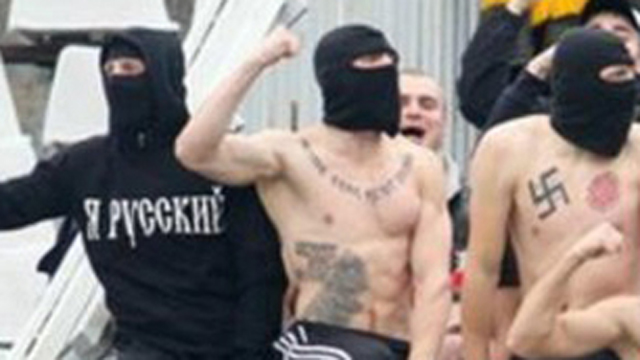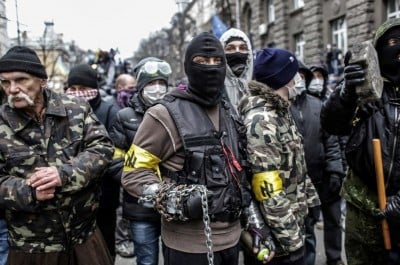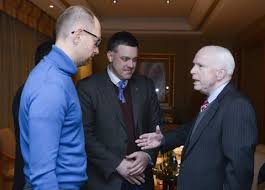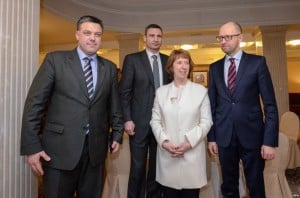Is antisemitism at play in Russia/Ukraine conflict?
This posting has these items, whose authors disagree with each other:
1) HaAretz: Ukrainian nationalists strive to shake off allegations of anti-Semitism, Lolita Brayman finds that the influence of neo-Nazi groups, of which there are several, are not as influential as suggested;
2) World Policy blog: Fears of Anti-Semitism Spread in Ukraine, Konrad Putzier points to Ukraine’s history of associating oppressive Russian government with Jews and Bolsheviks;
3) JTA: Ukraine chief rabbi accuses Russians of staging anti-Semitic ‘provocations’, an American/Ukrainian rabbi argues that any antisemitic incidents are due to Russian provocations to turn the West against the new government;
4) Global Research: Ukraine and the “Politics of Anti-Semitism”: The West Upholds Neo-Nazi Repression of Ukraine’s Jewish Community, Prof Michel Chossudovsky makes the strongest case that EU and US politicians are doing business with a clearly antisemitic force.;
5) x ;

Ukrainian Neo-Nazis pay tribute to Stepan Bandera, a Nazi collaborator who led the pro-Nazi Organization of Ukrainian Nationalists (OUN-B). The contemporary Neo-Nazi Svoboda Party follows in the footsteps of the OUN-B. Photo by Reuters.
Ukrainian nationalists strive to shake off allegations of anti-Semitism
Anti-government protesters say Nazi name-calling is propaganda designed to undermine their movement.
By Lolita Brayman, Haaretz
February 28, 2014
Ukraine’s struggle for independence is plagued by memories of fascism. Nationalists fought more than once against the Soviets in the last century, even when it meant aligning with Nazi Germany.
This is a country that both idolizes and condemns a former leader who collaborated with the Nazis – Stepan Bandera. He is denounced by many Ukrainians and Jewish groups for mass killings, but he is also beloved for refusing to rescind the proclamation of an independent Ukrainian state in 1941.
In the past, Ukrainian Jews suffered pogroms and government-sanctioned persecution, and anti-Semitism is still a threat. For instance, the opposition coalition, which includes the Svoboda party, has been criticized for far-right extremism. Complaints have been filed against Svoboda’s leader, Oleh Tyahnybok, for alleged incitement and racist remarks, such as saying Ukraine was headed by a “Muscovite-Jewish mafia.”
When Ukrainian nationalists and far-right groups began protesting against Viktor Yanukovych’s government on Kiev’s Maidan Square, many Western and Russian media outlets called the demonstrations fascist with anti-Semitic undertones. Armed and masked protesters brandished nationalist symbols linked with the fascism of yesteryear.
This included the Celtic cross, which has replaced the swastika for many modern white-power groups, and the wolf-hook SS insignia. There was also the symbol 14/88. The 14 represents a 14-word slogan used by white nationalists, and the 88 stands for “Heil Hitler” – H is the eighth letter of the alphabet. Finally, there was the Black Sun occult symbol, with which the Third Reich adorned a castle hall.
Some researchers and protest groups say the allegations of fascism and anti-Semitism are propaganda to undermine the protests.
The right-wing and nationalist umbrella group, Pravy Sektor, grabbed center stage after January 16, when Yanukovych approved laws that criminalized participation in anti-government protests. The movement’s press secretary, Artem Skoropadsky, called the fascism accusations “forms of official Russian propaganda that successfully change the meaning of ‘nationalism’ to ‘Nazism.’”
Anton Shekhovtsov, a Ukrainian researcher of European far-right groups and a fellow at the Radicalism and New Media Research Group in Britain, has said neo-Nazi groups are only a very small part of the protest.
“The movement is tolerant of other organizations’ extremist views but does not necessarily support them,” Shekhovtsov said. “They don’t exclude people and want to unite protesters for a stronger opposition.”
Some Pravy Sektor protesters on the Maidan sported yellow armbands with the wolf hook symbol revealing their specific political party affiliation—that of the Social National Assembly (SNA), a largely Kiev-based neo-Nazi organization. Other more openly anti-Semitic parties are White Hammer and C14, the neo-Nazi youth wing of the Svoboda party.
According to Pravy Sektor’s press secretary, the movement consists of many different groups and individuals. “This is not just a long-term rally, but a national, liberation movement,” he said in early February.
Timothy Snyder, a history professor at Yale, summarized the name-calling in an article for The New York Review of Books. He called it an “attempt to reduce the social tensions in a complex country to a battle of symbols about the past.”
Heroic picture of the past
Protesters have marched carrying photos of Bandera and under red-and-black flags of the Ukrainian Insurgent Army, the nationalist paramilitary and later partisan army that fought both the Nazis and the Soviets. On Maidan Square, these images represent the history of war and struggle for Ukraine’s sovereignty, not Nazism, said Vyacheslav Likhachev, a researcher at the Euro-Asian Jewish Congress.
According to Likhachev, “the provocative symbols have to be understood in the context of a Ukrainian, heroic picture of the past. In a contemporary context, it is not correct to associate Bandera with neo-Nazis.”

A picture from the Ukrainian attackers’ page on a local social media site, according to Arab-Israeli students who said gangs of skin heads viciously attack foreigners, Arabs and Jews. From Israelis in Odessa: We’re attacked by neo-Nazis, Ynet news, November 2013.
Two attacks on Kiev Jews took place in one week in January and added fuel to the name calling. Also, last Saturday, a Ukrainian rabbi called on Kiev’s Jews to leave the city, fearing that the small community could fall victim to the increasing violence. At least four Jewish protesters were killed during demonstrations in the days leading up to Yanukovych’s ouster by parliament. Overall, more than 70 Ukrainians were killed.
Many media outlets began equating the attacks and the rabbi’s comments with the protests in general, which suggested that the protesters were anti-Semites and that the Jewish community was a target.
Likhachev says the four Jews killed were victims of police brutality and sniper shots; they weren’t targeted as Jews. “Jews are in danger because of the bigger problem of violence, which affects all Ukrainians,” he said.
Josef Zisels, a vice president of the World Jewish Congress, said that “the Jews of Ukraine participate in protests, though not as a community but as citizens of Ukraine who are tired of the cynical actions of the government.”
Pravy Sektor and other protesters have dubbed themselves the defense forces of the protests; they’ve actually provided some stability. For example, the protest leaders have proposed that Kiev synagogues be guarded, along with streets in Jewish areas.
“The protesters understood extremely well that they’ve been posed to take the blame by the state propaganda mechanism,” Likhachev wrote in a report published by the Euro-Asian Jewish Congress, pointing to provocations by the government.
The violence on Maidan and elsewhere has simmered down, but protesters are still on the streets; the most recent trend is the toppling of statues of Lenin and other Soviet leaders. Pro-Western Ukrainians are offended by these reminders of Soviet rule, but others are proud of Soviet accomplishments.
In any case, Ukraine’s political future is uncertain and the cultural divide could widen.
Fears of Anti-Semitism Spread in Ukraine
By Konrad Putzier, World Policy blog
March 03, 2014
Could Europe witness its first pogrom against Jews since the 1940s? As Ukraine inches closer to civil war, the country’s Jewish population is growing anxious. Late last month, a Kiev rabbi made headlines when he urged his co-religionists to leave the country. A Ukrainian-born member of the U.S. Jewish advocacy group UJA Federation recently told me that his organization is monitoring the situation in Ukraine with great concern.
Cause for the anxiety is the rise of the Right Sector, a nationalist militant group crucial to President Viktor Yanukovych’s overthrow that now appears to hold great sway over the fragile Ukrainian government. Some members of the Right Sector are overt anti-Semites. Isolated beatings of Jews around Kiev’s independence square have already been reported. This weekend, the Right Sector called for its members to mobilize against a Russian intervention. The prospect of an armed, anti-Semitic mob in a largely lawless country should give everyone cause for alarm.
To Westerners, fighting for freedom and attacking Jews seem like an anachronism. But anti-Semitism has always existed alongside the Ukrainian independence movement. Throughout the 20th century, every uprising or civil war in Ukraine was accompanied by mass murder of Jews. The parallels to today are disturbing.
The first violent struggle for Ukrainian independence took place during the Russian civil war between 1918 and 1920. Following the collapse of the Tsarist Empire, Ukrainian nationalists declared an independent Ukraine, and tried to defend it against the Red Army and White troops. Anti-Semitism was widespread at the time, and all warring parties on the territory of today’s Ukraine committed pogroms. But the nationalists of the Ukrainian Directorate were especially brutal.
Nationalist troops murdered thousands of Jews – at least partially because they associated all Jews with the hated Bolsheviks. Jews were strongly represented in the Bolshevik leadership (the commander of the Red Army, Leon Trotsky, was a Jew), and nationalists often spoke of the “Jew-Bolshevik” as their enemy. Killing Jewish people was justified as a means of fighting against Bolshevik collaborators. In fact only very few Ukrainian Jews had ties to the Bolsheviks, but that did little to dispel the myth of their collaboration.
During World War II, certain Ukrainian nationalists once again targeted Jews as alleged agents of Bolshevik rule. Following the Nazi invasion in 1941, Ukrainians killed a large number of Jews in pogroms with the help and at the instigation of the Germans. The pogroms would never have happened without German encouragement, and they pale in comparison to the subsequent mass murder at the hands of SS and Wehrmacht. But they are nevertheless continuation of Ukrainian nationalist anti-Semitism.
As historian Timothy Snyder writes in his book “Bloodlands”, the Nazis were able to recruit Ukrainians en-masse because they played on the popular belief that Jews were responsible for the hated Soviet power, which had killed millions of Ukrainians through famine and terror in the 1930s.
Today’s militant Ukrainian nationalists trace their roots back to the nationalists who fought Bolshevik power during the civil war and in the 1940s. They also employ a very similar brand of anti-Semitism as some of their predecessors.
In 2004 Oleh Tyahnybok, leader of the nationalist Svoboda party and one of the three signatories of last month’s interim peace deal with Yanukovych (along with Vitali Klichko and Arseniy Yatsenyuk), alleged that a “Jewish-Muscovite Mafia” is ruling Ukraine. By replacing the term “Jew-Bolshevik” with “Jew-Muscovite,” Tyahnybok continued the tradition of blaming Jews for supposed Russian aggression. That Jews were attacked during the protests against Yanukovych seems to indicate that others think like him.
In 1919, 1941 and today, the suggestion that Ukraine’s Jews are somehow collaborating with Moscow is ludicrous. Moreover, then as now only a small minority of Ukrainian nationalists is anti-Semitic. But Ukraine’s history shows that a radical minority can cause devastating violence and discredit an entire freedom movement.
In many ways, the situation of Ukraine’s Jews is much more secure today than in 1919 or 1941. It is still far from clear if a civil war will break out. And even if the country succumbs to violence, Jews are less likely to suffer. Ukrainian nationalists today are far more dependent on public opinion and support from the West, and would hopefully be loath to jeopardize this by attacking Jews.
But anti-Semitism is never entirely rational, and the West needs to brace for the possibility that a few radical Ukrainian nationalists could attack Jews even if it runs counter to their own interests. To prevent this, the U.S., the E.U., and the Ukrainian government need to make it clear to Svoboda and the Right Sector that any violence against Jews will turn them into pariahs and cause them to lose any potential support. This is not only in the interest of Ukrainian Jews, but of all Ukrainians who hope for closer ties to the E.U. After all, anti-Semitic violence could discredit the Maidan revolution and do more damage to the Ukrainian struggle for independence from Moscow than Putin ever could.
Putin’s invasion of Crimea has already thrown Eastern Europe back into the dark days of 20th century imperialism. Now it is up to Western leaders to make sure anti-Semitic violence doesn’t also make its comeback.
Konrad Putzier is a New York-based journalist. He blogs at thelongerview.org.
Ukraine chief rabbi accuses Russians of staging anti-Semitic ‘provocations’
By JTA
March 03, 2014
NEW YORK — Rabbi Yaakov Dov Bleich, a chief rabbi of Ukraine, accused Russia of staging anti-Semitic “provocations” in Crimea in order to justify its invasion of the former Soviet republic.
At a press conference in the Manhattan office of the United Jewish Communities of Eastern Europe, Bleich compared Russia’s behavior to that of the Nazis prior to the Anschluss invasion of Austria in 1938.
“Things may be done by Russians dressing up as Ukrainian nationalists,” he said, adding that it’s “the same way the Nazis did when they wanted to go into Austria and created provocations.”
Bleich, a vice president of the World Jewish Congress, also announced the creation of an aid effort, KievRelief.org, to fund security for synagogues and mosques and to provide humanitarian relief for all Ukrainians.
Bleich, who moved to Ukraine in 1989 from Brooklyn, was slated, along with other Ukrainian political and religious leaders, to meet with Secretary of State John Kerry on Tuesday. He said he will urge Kerry to be assertive with Russian President Vladimir Putin, to move the G8 Summit to Kiev, as a show of solidarity with Ukrainians, and to consider sending military support to Ukraine. While acknowledging that Americans are “war-weary,” he said Ukrainians need “boots on the ground to protect democracy” and to prevent “the cold war from getting hot.”
Asked about anti-Semitism among Ukrainian nationalists, particularly two far-right parties that have been included in the new government, Bleich acknowledged concerns but said the Jewish community has received assurances from top government leaders that their safety will be protected.
“The Russians are blowing this way, way out of proportion,” he said, referring to the issue of anti-Semitism among some Ukrainian nationalist factions.
He said that Ukrainians were united in response to the Russian intervention.
“There were many differences of opinion throughout the revolution, but today all that is gone,” he said. “We’re faced by an outside threat called Russia. It’s brought everyone together.”
Ukraine and the “Politics of Anti-Semitism”: The West Upholds Neo-Nazi Repression of Ukraine’s Jewish Community
By Prof Michel Chossudovsky, Global Research
February 26, 2014
The US and the EU are supporting the formation of a coalition government integrated by Neo-Nazis which are directly involved in the repression of the Ukrainian Jewish community.
There are about 200,000 Jews living in Ukraine, most of them in Kiev. This community is described as “one of the most vibrant Jewish communities in the world, with dozens of active Jewish organizations and institutions”. A significant part of this community is made up of family members of holocaust survivors. “Three million Ukrainians were murdered by the Nazis during their occupation of Ukraine, including 900,000 Jews.” (indybay.org, January 29, 2014).
Ukrainian Jews were the target of the Third Reich’s Einsatzgruppen (Task Groups or Deployment Groups) which were supported by Ukrainian Nazi collaborators (Wikipedia). These “task forces” were paramilitary death squads deployed in occupied territories.
Contemporary Neo-Nazi Threat against Ukraine’s Jewish community
While the Western media has not covered the issue, the contemporary Neo-Nazi threat against the Jewish community in the Ukraine is real. Ukrainian Neo-Nazis pay tribute to Stepan Bandera, a World War II-era Nazi collaborator who led the pro-Nazi Organization of Ukrainian Nationalists (OUN-B). The contemporary Neo-Nazi Svoboda Party which is supported by Washington follows in the footsteps of the OUN-B.
Reports from Kiev confirm that the Jewish community is the target of the Right Sector and the Neo-Nazi Svoboda party, which is supported and financed through various channels by Washington and Brussels:
“Ukrainian Rabbi Moshe Reuven Azman asked Kiev Jews to leave the city and, if possible, the country, due to fears that Jews might be targeted [by Svoboda Brown Shirts] in the ongoing chaos. … Some Jewish shops have been vandalized and other threats to the Jewish community have been received.
“I told my congregation to leave the city center or the city all together and if possible the country too… I don’t want to tempt fate…but there are constant warnings concerning intentions to attack Jewish institutions,” Rabbi Azman told Maariv. (JN, February 24, 2014)

March of Ukrainian neo-nazis. No date given.
The leaders of the Ukrainian Jewish Community contacted Israel’s Foreign Minister Avigdor Lieberman requesting the assistance of Israel. (Edward Dolinsky, head of the umbrella organization of Ukraine’s Jews).
Israel –which is unofficially a member of the Western military alliance (US-NATO-Israel)– has remained mum on the subject: Real Politik Uber Alles. No statement has emanated from Tel Aviv. The Israeli government has not responded to the request of the Ukrainian Jewish Community nor has it made any statements.
America’s pro-Israeli lobby The American Israel Public Affairs Committee (AIPAC) has not taken a stance on the issue. Not a word from Israel’s Prime Minister Netanyahu.
The Western Media: Talking about the Neo-Nazi Threat to Ukraine’s Jewish Community is Taboo
Within the Western media, news coverage of the Neo-Nazi threat to the Jewish community in Ukraine is a taboo. There is a complete media blackout: confirmed by Google News search, mainstream coverage of the threat to the Jewish community in Ukraine is virtually absent.
An article in the current issue of The New York Review of Books constitutes the pinnacle of falsehood and media distortion. The Jewish community in Ukraine is portrayed as an unbending supporter of the Maidan protest movement led by Right Sector Neo-Nazis:
The protesters represent every group of Ukrainian citizens: Russian speakers and Ukrainian speakers (although most Ukrainians are bilingual), people from the cities and the countryside, people from all regions of the country, members of all political parties, the young and the old, Christians, Muslims, and Jews. Every major Christian denomination is represented by believers and most of them by clergy. The Crimean Tatars march in impressive numbers, and Jewish leaders have made a point of supporting the movement.
In its broader coverage of the Ukraine “protest movement”, the Western media has failed to acknowledge the nature of the opposition, casually referring to “radical elements”.
What is not mentioned is that these “radical elements” supported and financed by the West are Neo-Nazis who are waging a hate campaign against Ukraine’s Jewish community.
The Israeli Media and the State of Israel
The Israeli media toes the line. The hate campaign against the Ukrainian Jewish community is not the object of concern. The Jerusalem Post casually dismisses the evidence of crimes committed against Ukraine’s Jewish community under the title:
“Although there is “no information of Jews being targeted” as of yet, Jewish institutions are under self-imposed lock-down”.
According to the JP, there is no “defined threat against them”:
“There is currently “no information of Jews being targeted, but there is a danger because of vigilante groups,” Chief Rabbi Yaakov Bleich told The Jerusalem Post on Sunday.“We have not seen any random attacks and we hope people are basically interested in law and order and not in mayhem,” he said, expressing his hope that protesters would begin turning in their arms tomorrow as scheduled.
“We are definitely worried about security and everybody should keep their guard up,” the American-born rabbi cautioned. “That’s because of the general situation. There are no threats that we know of.”
… There is a great deal of uncertainty among Kiev’s Jews, said one community member, speaking anonymously.She said that while there has been no direct threat against Jewish institutions, two Jews were attacked during the protests and the general feeling of insecurity pervading the city has affected its Jews as well.
Things will calm down within a week, but life is still far from normal at the moment, she said.” (Ukraine’s Jews ponder their future, Jerusalem Post-Feb 24, 2014)
According to “expert opinion” quoted by the JP, the spread of swastikas in Kiev’s urban landscape should be of no concern. According to Vyacheslav Likhachev, “an expert on the far-right associated with the Euro-Asian Jewish Congress”, the Svoboda Neo-Nazi activists are not attacking Jews. In an utterly twisted logic expert Likhachev quoted by the JP intimates that the (former) Yanukovych government is responsible for anti-semitic violence;
The two incidents of anti-Semitic violence since the beginning of the protests, he alleged, were most likely provocations by the government looking for a pretext to clamp down on its political opponents.
“There is no real special danger for the Jewish community due to anti-Semitism from protesters,” he said.
According to Likhachev, the authorities tried to recruit him to take part in apropaganda campaign against the protesters and he believes that, given the lack of emphasis placed on Jews and other ethnic minorities by the opposition,including such factions as Svoboda, it is more likely that the attacks were part of this alleged campaign. (Ibid)
According to the JP, the issue is one of “transition”, which will be resolved once a new government is installed .
“Despite his [Likhashov’s] optimism fear pervades the local Jewish community, as it does the entire Ukraine, during the transition period.”
Ironically, while the Israeli media dismisses the matter, the Arab media has provided a far more balanced assessment of the threat to the Jewish community in Ukraine.
Rabbis in Kiev and across Ukraine spoke out, warning their congregations to stay off the streets and remain in their homes. The Jewish Agency in Jerusalem has moved swiftly to offer aid to elderly Jews living in greater Kiev. Food-delivery men are braving gunshots and Molotov cocktails to help them. Reports from Kiev say the police have been replaced by roving bands of undetermined loyalty.
… The fresh report of the firebombing of a new synagogue in Zaporizhia, 250 miles southeast of Kiev, increased the alarm in Israel and accelerated planning for all contingencies, including evacuations. (John Batchelor, Ultranationalist neo-Nazi parties on the march in Ukraine, Al Jazeera, February 25, 2014
The Politics of Anti-Semitism: Anti-Semitism Practised at a Political Level
Ironically, while renowned scholars critical of the State of Israel for violating the fundamental rights of Palestinians are accused of being “anti-semitic”, nobody bats an eye lid when John McCain (see image below with the leader of the Neo-Nazi Svoboda Party Oleh Tyahnybok, centre), … and bottom, EU foreign policy chief Catherine Ashton with Oleh Tyahnybok, left, John Kerry, Francois Hollande and Angela Merkel (among others) openly pay lip service to Neo-Nazism in the Ukraine.
Is the Western media “anti-semitic” when it fails to report crimes committed against the Jewish population in Ukraine?
Is the self-proclaimed “international community” anti-semitic when it upholds in the name of “democracy” a “protest movement” led by Neo-Nazis?
Is Netanyahu an anti-semite by tacitly supporting US-EU-NATO geopolitical interests in Ukraine, with total disregard to the rising tide of fascism and anti-semitism?
Michel Chossudovsky is an award-winning author, Professor of Economics (emeritus) at the University of Ottawa, Founder and Director of the Centre for Research on Globalization (CRG), Montreal and Editor of the globalresearch.ca website. He is the author of The Globalization of Poverty and The New World Order (2003) and America’s “War on Terrorism”(2005). His most recent book is entitled Towards a World War III Scenario: The Dangers of Nuclear War (2011). He is also a contributor to the Encyclopaedia Britannica. His writings have been published in more than twenty languages. He can be reached at crgeditor@yahoo.com


